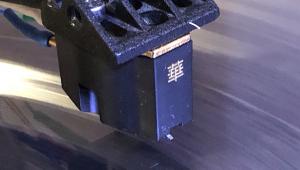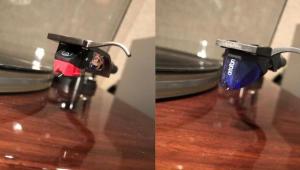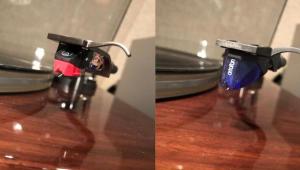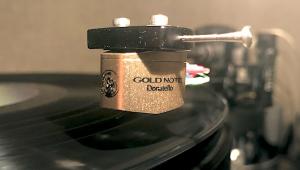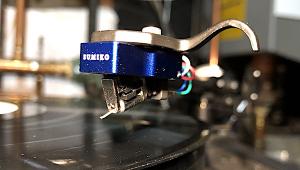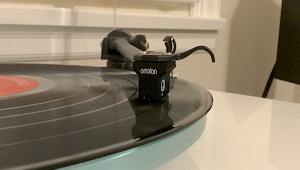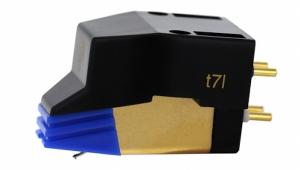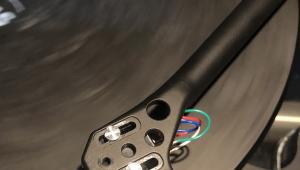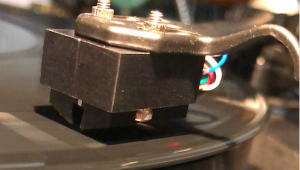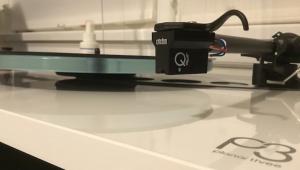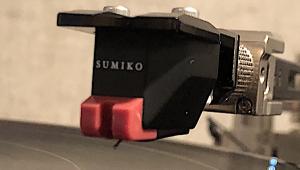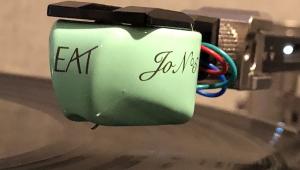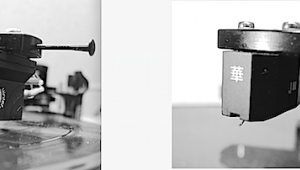Ortofon's 2M Black LVB 250 Cartridge Delivers Smooth, Sweet and Well-Detailed Sound

To celebrate Beethoven’s 250th birthday Ortofon recently introduced the 2M Black LVB 250 MM. “Cartridge named after a deaf dude” jokes aside (Following Ortofon’s announcement I heard that from readers more than a few times), Ortofon has upgraded the 2M Black with a few useful features, the main one being using the low mass boron cantilever/nude Shibata assembly found on the $2879 Cadenza Black. In addition, Ortofon has developed a new rubber suspension compound based on Multi-Wall Carbon Nano Tube nano filler compound for which Ortofon claims “desirable mechanical properties” as well as greater environmentally friendly production characteristics. Obviously the lighter, stiffer Boron cantilever required an suspension change to maintain the standard 2M Black’s tracking capabilities, which based on the specs are the same.
These changes result in a price increase of approximately $300.00 to $999. The specifications remain close to identical but for a claimed 1dB greater channel separation at 1kHz and an increase in recommended tracking force from 1.5 to 1.6 grams.
Set Up
I installed the 2M Black LVB 250 on the SME 6 ‘table here for review in Stereophile and used it to drive two very different sounding phono preamps (reviews to follow): The hybrid vacuum tube Hagerman Audio Trumpet MC ($1099) and from Spain the solid state QHW The Vinyl (price dollar/Euro dependent but today $644.83+ $25 shipping). Both of these in my book are “super values”, but back to the cartridge review.
Firstly, the 2M Black LVB tracking at the recommended 1.6 grams meets the specified excellent tracking spec using the Ortofon test record.
First up was Neil Young’s new Young Shakespeare (Reprise 093624889519) a remarkable solo acoustic performance recorded January 22, 1971 at the Shakespeare Theatre, Stratford, CT three days after the Massey Hall 1971 recording (Christgau gave it a bomb, but I liked it). This one, originally a 16MM film shoot by a German television crew probably with synch to a Nagra or another field recorder and to make it work the Plangent process was applied after digitization at 192/24 . Plangent recovers and locks to the bias signal on the tape and removes transport artifacts like “scrape flutter” and other issues like “in and out of phase” producing speed drift. The result here is pleasingly smooth and considering the circumstances, solid imaging and transparency.
With either of these two phono preamps, the 2M Black LVB 250 delivered warmth, body, timbral honesty and especially transient “speed” I don’t usually associate with most moving magnet cartridges (though there are a few), though as you might imagine there was more lower- midbass warmth from the tube-based preamp. Even there though, the sound never got thick and slow. Not many listeners would think MM hearing this record through the 2M Black LVB. Neil’s strumming on “Helpless” was clean, though not shimmering (the recording isn’t an airy, open spacious affair), with pleasing attack, honest sustain and satisfying decay combined with instrumental body. Nicely pressed (I think at Record Industry): on 140gram vinyl.
For a speedy, fast play you can’t go wrong with the late Chick Corea’s Now He Sings, Now He Sobs ( B00 29363-01 an early “Tone Poet” reissue of a Solid State original). It displays the cartridge’s microdynamic authority, nimble tracking ability and transient clarity and “snap”. A grea snare drum sound from engineer Don Hahn at Phil Ramone’s A&R Studios adds to the record’s sonic pleasures that the 2M LVB delivers intact. The percussive piano produced sound effects and inside the sounding board “zings” on “ Now He Beats The Drum-Now He Stops” made me jump.
Unfortunately, I did not have a standard 2M Black here with which to compare the LVB edition. However, I did have a Cadenza 2M Black ($2879) sent by SME for the Model 6 review and no surprise, the approximately 3X the cost Cadenza was superior in every way, especially in terms of soundstage width, depth and image three-dimensionality. But this is a review of the $999 2M Black LVB 250 so what more fitting a way to end it than to describe how it performed decoding Sir Simon Rattle’s take on Beethoven’s 3rd symphony from the Berlin Philharmonic Beethoven Symphonies box set (BPHR 160092) recorded to 192/24 using a pair of M-S configured microphones. Through both the solid state and hybrid vacuum tube phono preamps the 2M Black 250 produced full bodied string textures, burnished brass and an overall richness not unexpected from a well-designed and built MM cartridge. The orchestra’s dynamic ebb and flow was well-presented through both phono preamplifiers with greater sense of hall “air” and woodwind clarity evident through the solid state until but there was no mistaking the 2M Black LVB’s generally warm, rich yet pleasingly open and smooth tonal balance and responsive rhythm’n’pacing that comes as close to a good moving coil design as I’ve heard from a MM. For the obstinate who stick with and prefer moving magnet to moving coil cartridges, the 2M Black LVB 250 makes the case as well if not better than any currently available MM at least that Ithat I know of.
Specs
Output voltage at 1000 Hz, 5cm/sec.: 5 mV
Channel balance at 1 kHz: < 1 dB
Channel separation at 1 kHz: > 27 dB
Channel separation at 15 kHz: 15 dB
Frequency response: 20-20.000 + 2 / - 1 dB
Tracking ability at 315Hz at recommended
tracking force: 80 µm
Compliance, dynamic, lateral: 22 µm/mN
Stylus type: Nude Shibata
Stylus tip radius: r/R 6/50 µm
Cantilever material - Boron
Tracking force range: 1.5-1.7 g (15-17 mN)
Tracking force, recommended: 1.6 g (16 mN)
Tracking angle: 20°
Internal impedance, DC resistance: 1.2 kOhm
Internal inductance: 630 mH
Recommended load resistance: 47 kOhm
Recommended load capacitance: 150-300 pF
Cartridge color, body/stylus: Black/Black
Cartridge weight: 7.2 g


